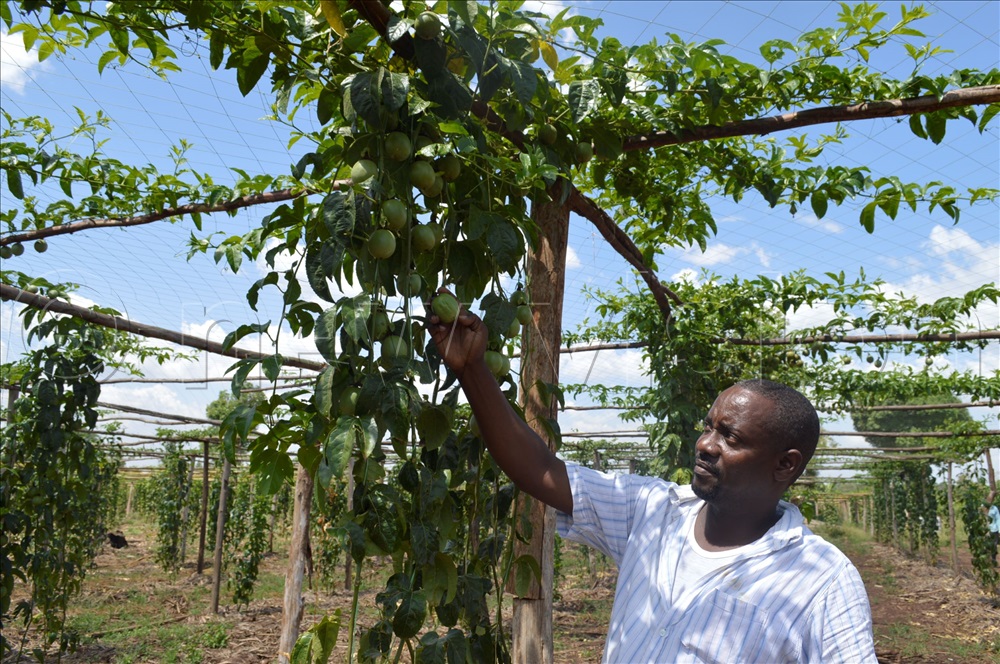By Umar Nsubuga
Passion fruit is a rewarding crop, but it is susceptible to various diseases that can affect its productivity.
Steven Byandala, an agronomist says farmers can take several preventive measures to minimise the occurrence of diseases and ensure healthy plants.
Byandala says many commercial farmers just get seedlings but it’s important to start with disease-free planting materials, always use high-quality, disease-free seeds, cuttings, or seedlings from reputable suppliers. Avoid using materials from infected plants, as many diseases are passed on through the planting materials.
He says grafting passion fruit vines onto disease-resistant rootstock can help protect plants from soil-borne diseases like Fusarium wilt.

“Clear the field of any old or diseased vines before planting new crops. Disease-causing pathogens can survive in plant debris, so ensure the field is clean and free from previous crop residues,” he advises.
Remove infected plants, regularly scout for early signs of disease and remove and destroy infected plants to prevent the spread of pathogens to healthy plants, he explains.
He says tools used for pruning or harvesting should be disinfected regularly to avoid spreading diseases from one plant to another.
Spacing and pruning
Twaha Kakooza, a commercial passion fruit farmer says planting passion fruits with proper spacing allows for good air circulation around the plants. Crowded plants trap moisture, which creates favourable conditions for fungal diseases.
He says regular pruning of excess or dead leaves, as well as old or unproductive branches, ensures good ventilation within the canopy. It also reduces the humidity levels, which can help control diseases like anthracnose and brown spot.
Improve soil drainage
Many diseases thrive in waterlogged soils. To prevent root diseases like Phytophthora root rot, he says farmers should ensure that the soil is well-drained. If you are in an area prone to flooding, consider planting on raised beds to improve drainage.
Also, applying organic mulch around the base of the plant can help retain moisture without causing waterlogging, while also reducing soil erosion.
Practice crop rotation
According to Byandala, growing passion fruit in the same area year after year increases the likelihood of soil-borne diseases. Rotate passion fruit with other non-host crops (such as legumes or maize) every 2-3 years to reduce disease pressure.
“Growing passion fruit alongside non-susceptible crops can help break the disease cycle and reduce the spread of soil-borne pathogens,” he says.
Byandala says applying fungicides can help prevent common fungal diseases like powdery mildew or alternaria blight. Organic options include using neem oil or copper-based fungicides, while chemical fungicides like mancozeb or chlorothalonil can be used as a preventive measure.
Control pests
Kakooza says certain insects, like aphids, whiteflies, and thrips, spread viral diseases such as woodiness virus and mosaic virus. Controlling these pests with organic insecticides or integrated pest management (IPM) techniques can reduce the risk of disease.
In high-pest areas, farmers can use fine mesh netting around the plants to block pests from reaching the vines.
Watering and irrigation
Avoid wetting the leaves and vines when irrigating, as wet foliage encourages fungal diseases. Instead, use drip irrigation or water at the base of the plant to minimise moisture on leaves and vines.
Byandala says watering early in the day allows the foliage to dry before nightfall, reducing the risk of moisture-loving diseases like leaf spot or downy mildew.
He says passion fruits need balanced nutrition to stay healthy and resist disease. Over-fertilising, especially with nitrogen, can make plants more susceptible to disease. Use compost or well-balanced fertilizers rich in phosphorus and potassium to strengthen the plant’s natural defenses.
Maintain a slightly acidic to neutral pH (6.0-6.5) to optimize nutrient uptake and reduce the risk of certain diseases. Use lime if the soil is too acidic or sulfur if it’s too alkaline.





